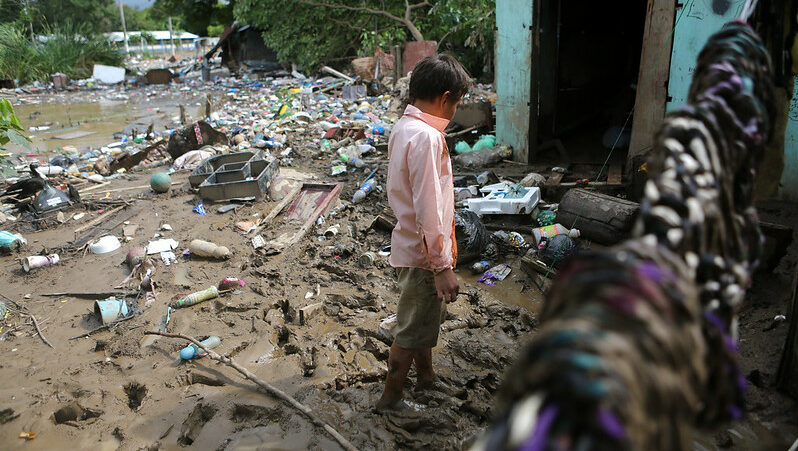As ministers from climate-vulnerable nations met with donor countries this week, the issues they raised were not new. In fact, they have been heard many times before.
But the virtual meeting hosted by the UK gave space for developing nations to articulate how to plug a finance gap and increase support to communities on the frontline of the climate crisis. Now donor countries must respond.
More than a decade ago, rich nations agreed to mobilise $100 billion a year in climate finance by 2020 to help developing nations cut emissions and cope with climate impacts. But that goal hasn’t been met.
Climate finance is overwhelmingly delivered as loans rather than grants, exacerbating debt challenges worsened by the Covid-19 pandemic. Only a fifth of the finance is directed towards adaptation, a pressing investment need, and little cash is trickling to the local level.
Under fire over aid cuts, the UK promised to make scaling-up climate finance a priority at the G7 meeting it is hosting in June. Donor countries agreed to continue discussing how to improve the access, quantity and quality of climate finance in the run up to Cop26.
Repackaging old promises won’t cut it. To restore trust, donor countries will need to respond to vulnerable nations’ concerns, link debt relief with climate action and provide more and better-quality finance.
This week’s stories…
- UK pledges to make scaling up adaptation finance a priority at G7 summit
- India calls out rich nations for setting net zero goals over robust short-term targets
- Saudi Arabia aims for 50% renewable energy by 2030, backs huge tree planting initiative
- EU member states and lawmakers at loggerheads over 2030 climate target
- Under fire over aid cuts, UK hosts summit to help vulnerable nations fund climate action
- Rare IMF relief offers a hope of green recovery to debt-laden nations
…and climate conversations
- It took the Suez Canal crisis to highlight the scale of the polluting shipping sector – Madeline Rose, Pacific Environment
‘Pie in the sky’
That’s how India’s power and renewable energy minister described the net zero goals of major emitters at an International Energy Agency summit this week.
Raj Kumar Singh called out those favouring distant targets over short-term action, sending a chill through the panel attended by China, the US and the EU.
Singh has a point. Net zero pledges need to be translated into robust policies in the next five and 10 years. But India is no gold standard for climate ambition and has so far resisted increasing its own 2030 plan.
However, Singh’s intervention is a stark reminder that efforts to cut emissions must square with development challenges. For energy consultant Swati Dsouza, this should put to rest all speculation on India announcing a net zero goal.
Sun and trees in the desert
Saudi Arabia has announced plans to generate half of its energy from renewable sources by 2030. While the Kingdom basks in plenty of sunshine, it will require steep investments in solar technologies, with renewables currently accounting for less than 0.5% of the nation’s power supply.
Crown prince Mohammed bin Salman also wants to plant 10 billion trees across the country and another 40 billion across the Middle East. But his plan gives no detail on how he will go about it.
Experts suggested ghaf trees, which are endemic to the Arab peninsula, need little water and live long, would be a good choice for areas affected by desertification.
Easter brings a long weekend in Europe. We will be back on 6 April.
